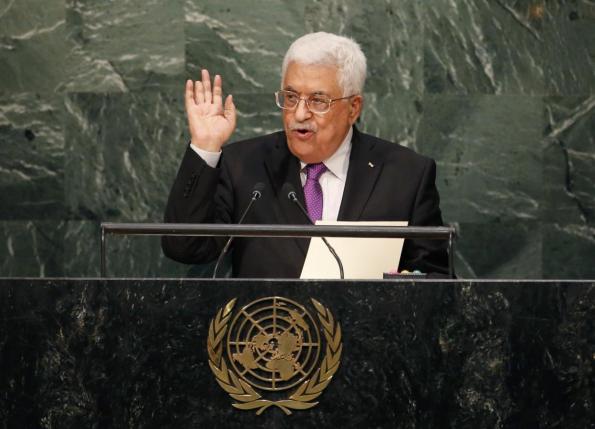The west’s blind eye hurts both Israelis and Palestinians

On April 18, a bus was bombed in Jerusalem in a terror attack. Hamas, the internationally recognized terror organization that controls the Gaza Strip, praised the attack and said that the group “blesses the Jerusalem operation.” Israeli Prime Minister Benjamin Netanyahu condemned the attack immediately, pledging to hold the terrorist accountable. So far, President of the Palestinian Authority Mahmoud Abbas has remained silent. In February 2015, a federal jury found the Palestinian Authority and Palestinian Liberation Organization responsible for supporting six terror attacks in Israel — including similar bombings and deadly shootings — that claimed the lives of American victims. However, the western world and the U.N. continue to believe Abbas’s claims that he is eager to make peace. Perhaps they are influenced by some of his favorable-sounding comments over the years.
—On making peace: While addressing the U.N. General Assembly in September 2015, Abbas claimed, “We are working on spreading the culture of peace and coexistence between our people…”
—On rejecting violence: While addressing the U.N. General Assembly in 2011, Abbas said: “The PLO and the Palestinian people adhere to the renouncement of violence and rejection and condemning of terrorism in all its forms…”
—On aiming for a two-state solution: Also in his 2011 address to the UN, Abbas stated, “The goal of the Palestinian people is the realization of … their independent State of Palestine, with East Jerusalem as its capital, on all the land of the West Bank, including East Jerusalem, and the Gaza Strip…”

As a result, Abbas is viewed by many influential world leaders as a partner for peace. In a 2013 address to the people of Israel, President Obama stated, “I genuinely believe that you do have a true partner in President Abbas.”
In reality, Abbas says one thing to the U.S. and the west and quite another to his people and the Arab world. Both through his words and through his actions, Abbas contradicts his claims that he desires to live in peace with Israel. By evaluating his statements that were not directed at the west, it becomes clear that Abbas and the P.A. promote hate, incite violence, reject a two-state solution, and deny Israel’s right to exist.
—On promoting hate: Abbas’s party, Fatah, releases hateful political cartoons that often use classic forms of anti-Semitic imagery. For instance, Fatah released two cartoons following the November 2015 Paris attacks. One depicted Netanyahu and an ISIS figure crouched on a balcony aiming a gun with the Eiffel Tower in the background, implying that Israel was behind the attacks in collaboration with the terrorists. Another depicted a matchbox with the word “terrorism” written across the front containing an “ISIS” match and a “Jewish” match. Meanwhile, some schools under the P.A.’s ministry of education are named after terrorists.
—On inciting violence: Abbas says that he’s opposed to violence, and yet just last month he referred to the current terror wave of stabbings and vehicular ramming attacks as “legitimate peaceful protest.” He meets with the families of terrorists and has praised them as martyrs, and his government builds memorials in their honor. Abbas says that Israel is defiling the temple mount, and on Palestinian television he said, “We welcome every drop of blood spilled in Jerusalem.” His party Fatah released a music video on its TV channel calling on Palestinians to “drown [Israelis] in a sea of blood, kill them as you wish.”
—On rejecting a two-state solution: Although he has repeatedly told the U.N. that he supports a two-state solution, Abbas rejected Prime Minister Olmert’s proposal in 2008 that would have established a Palestinian state in the West Bank (after land swaps), with the eastern parts of Jerusalem as its capital, the Old City under international control, and a tunnel built connecting the West Bank and the Gaza Strip. Similarly, in March 2016, Abbas rejected a U.S. peace initiative offered by Vice President Biden that included designating the eastern part of Jerusalem as the capital of a future Palestinian state and a halt in settlement construction in return for the recognition of Israel as the Jewish State.
—On denying Israel’s right to exist: At the same time, Abbas denies Israel’s right to exist. In a Palestinian TV interview in March 2016, Abbas referred to all of Israel as occupied territory and claimed that “we’ve been under occupation for 67 or 68 years.” By claiming that an occupation began in 1948, when Israel was reestablished, and not 1967 when Israel gained control of the West Bank in a defensive war, Abbas denies Israel’s right to exist even according to the 1947 Partition Plan. He publically claims that settlements are the obstacle to peace, but also claims that the whole nation is occupied, therefore contradicting himself. On Palestinian television in 2014, Abbas was even more direct: “The Palestinians won’t recognize the Jewishness of the State of Israel and won’t accept it.” Other politicians in his Fatah party are entirely explicit. A senior official of the P.A., Abbas Zaki, said in a 2011 interview, “If I say that I want to remove [Israel] from existence, this will be great, great, [but] it is hard. This is not a [stated] policy. You can’t say it to the world. You can say it to yourself.”
It may be tempting to hope that Abbas is committed to his more peaceful assertions, but in light of his own stated intentions and actions, that would be turning a blind eye. Unfortunately, that blind eye leads to disastrous consequences for both Israelis and Palestinians. It causes many in the international community to view Israel as the sole party responsible for the lack of peace in the region, which gives the Palestinian Authority the legitimacy to continue to incite violence and hatred among its people. This delays peace even further. Abbas’s duplicity, for example, has helped lead western powers such as France and Spain to draft one-sided resolutions condemning Israel’s settlement policy as the obstacle to peace, with no mention of the P.A.’s actions. Similarly, just this past week, the United Nations Educational, Scientific, and Cultural Organization (UNESCO) presented a resolution that entirely ignored Jewish ties to the Temple Mount, the Cave of the Patriarchs, and Rachel’s Tomb. Not only does this blatantly ignore history, but it also encourages violence and hatred as some Palestinians are led to believe that Israel is attempting to desecrate these sites. Terrorists then have further motive and support from their own people to attack Israeli civilians.
Abbas has shown that he is willing to lie in order to gain credibility among the international community. In the meantime, he incites violence and rejects peace. Tragically, both his own people as well as the people of Israel suffer from his duplicity. Abbas is entering his eleventh year of a four-year term, and no elections are in sight. As terror continues to plague Israel and Abbas prepares another U.N. resolution condemning settlements to divert attention from the P.A., it is crucial that western powers acknowledge his doublespeak. After all, opinions should always be based on reality rather than on selective hearing. Therefore, Abbas must be held accountable for all of his words and actions, and the role of Abbas and his government in the downfall of the peace process must be recognized and condemned on the international scale — if not for Israel’s sake, then for the sake of Abbas’s own people.
Originally published in The Tech.
Contributed by CAMERA Fellow at MIT, Suri Bandler.

